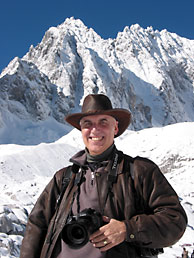
A midday flight so time to do a bit of writing up and generally getting back on track. We seem to be filming almost every hour of every day, so it doesn’t leave a lot of time to myself to catch up. My interpreter, Lilian, and I fly to Kunming, where we meet our new cameraman, Mr Qu, and director Mr Wang, who will take over for the rest of the series. We then fly on to Lijiang. Both aircraft leave on time, as every Chinese flight seems to, and we arrive to gleaming new airports at both destinations.
As we wait for the Lijiang flight Michelle, the TV company's general manager, buys a Chinese copy of James Hilton’s novel, Lost Horizon, which I had read just before coming to China. The book is a classic about the fabled paradise of Shangri-La, which many claim is in northwest Yunnan close to the border of Tibet. Driving to the town in the fading light shows how green and fertile the area is. Rice and many other crops are growing in fields alongside the road, which runs through a wide valley between verdant mountains.
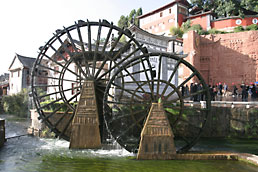
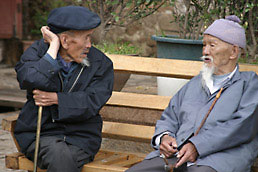
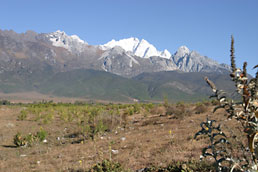
A huge modern fresco and a couple of working wooden water wheels mark the entrance to the historic part of Lijiang. The ancient roofs of Lijiang climb up the hill behind them. Ethereal Buddhist-style music wafts out from a record store we pass on the way, creating a soothe and calming atmosphere. Over subsequent days we pass many shops playing the same music, created by a type of flute made from gourds called a hulu si. I wonder whether it is a form of aural brainwashing for shop workers who have to listen to it all the time. There is only time to film a couple of takes of me by a bridge next to the water wheels before we have to return to our hotel, to meet the secretary of the local Communist Party.
Lijiang was hit by an earthquake in 1996, but while many buildings in the new part of the town were badly damaged most of the old town's ancient wood and stone buildings survived intact, withstanding the tremors far better than their newer concrete and glass counterparts. The old town dates back some 800 years and is now a UNESCO World Heritage site. The cobbled main street is pretty much geared towards tourists, something I would find along many of the other streets as well. Virtually every building seems to be a shop, selling everything from yak-horn combs to silver and jade jewellery, scarves, carvings, souvenirs and tea. The town is also awash with flowers and running water. Rivers seem to run alongside every street and between or behind the rows of houses and shops, so that to cross from one side of a street to the other often involves crossing a bridge.
Many people are wearing traditional costume. Most predominantly the blue dress of the Naxi minority group which makes up about two-thirds of Lijiang’s population. Others wearing fur hats and red-coloured outfits have much more rugged, weather-worn features and turn out to be Tibetan. Lijiang is only about about 125 miles from Tibet and there is a long affinity between the two regions. We film a number of scenes in the old town, with me walking along one of the narrow side streets which meander up the hill, looking at shops, bartering for silver bracelets and watching some being fashioned by a man using a hammer to shape the silver ingots on an anvil. The side streets are much less touristy and retain a quiet, unspoilt atmosphere. Few of the shops are actually run by local Naxi people these days. Most of the traders are outsiders, Han Chinese, who have moved in to profit from the burgeoning tourism trade, which I find sad.
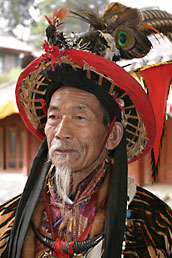
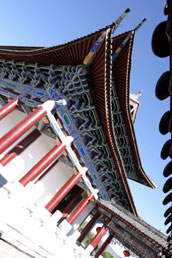
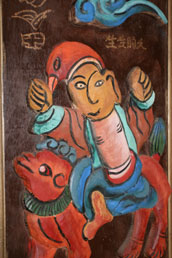
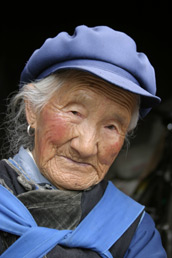
From the top of the hill there is a wonderful view of all the old town's rooftops and the green-frocked mountains behind. We walk down a sloping cobbled street to a Naxi house with a small courtyard in the front where I meet an old man who is a Dongba, the shaman of the Naxi people. He takes us to the nearby Dongba theatre where I chat on camera with him and a couple of his colleagues, all in wonderfully colourful costumes and headdresses which make them look extras from the Wizard of Oz. The Dongba retain many of the beliefs and customs of the original Naxi and are effectively the guardians of the ancient Naxi culture. The theatre is decorated with strange hieroglyphic animal symbols, representing the deities revered by the Dongba - although some look more like Smurfs. Most fascinating is the ancient pictograph writing system in an old book I am shown. The book has been handed down from father to son for six generations and the old man proceeds to sing me some of its contents. On closer inspection I see simplistic pictures of stick men and women, like you might expect a child to do at kindergarten.
The Dongba are among the last in the world to retain a pictograph writing system. The old man bemoans the fact that youngsters are not learning the ancient Dongba ways and worries that there are not enough continuing the old traditions. Only a few people understand the Dongba’s culture and can read the hieroglyphic writing, even fewer who can sing it like he can. Later that day, after I join some Naxi women dancing in a circle in the main square, we visit a museum dedicated to the Dongba culture. Much of the West's knowledge of it came originally from Austrian-American botanist and explorer Joseph Rock, who lived in northwest Yunnan for 27 years. His magazine accounts are said to have been the inspiration for Hilton's tale of Shangri-La and part of the museum is devoted to the legend.
A few days later I go back to the theatre to watch a performance of Dongba dances. They are lively and colourful, and very different to a concert of traditional Chinese music played on original instruments we witness the same evening at Lijiang's Naxi Music Academy. The academy director introduces me to the audience and we chat on stage afterwards. He, too, voices fears about modern influences eroding the Naxi culture and warns that its musical heritage is disappearing in the shadow of Everest.
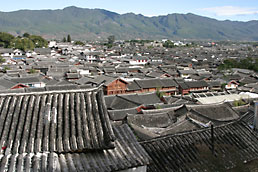
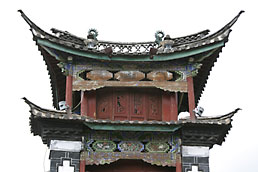
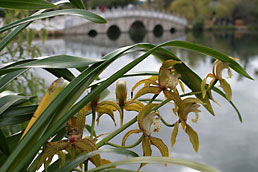
One morning we drive to Jade Dragon Snow Mountain, about 10 miles away. We had seen its 11 snow-capped peaks soaring above the surrounding plain and hills reflected serenely in Lijiang's Black Dragon Pool. On the way we pass rows of parked taxis, their drivers on strike over a proposal to outlaw older taxis. It seems even in paradise life is not always perfect. We also pass the world's longest golf course, the 8,450-yard Jade Dragon Golf Club, but sadly there is no time to stop. Instead we take the world's longest gondola ride up to the top station 15,000 feet high, giving glorious views of the Yunnan plateau, surrounding hills and mountains and the course below. A lot of people are carrying what look like flasks, not unusual in China as people often walk around with glass jars or flasks of tea. But these were disposable oxygen canisters to help counter the thin air. I feel a little light-headed but have no need of one myself. I also wish I hadn't put on my thermals and five layers of clothing as the sun is shining from a clear blue sky and it is warm, so warm Mr Qu strips off his top to go bare-chested. The one item of clothing I regret wearing most is a green fleece hat. I wonder why everyone is laughing, until Lillian points out that men only wear green hats as a public statement that their wives are unfaithful. I quickly take it off, and use it as padding to protect a teapot I post back home a few weeks later.
Afterwards we visit a nearby village where Rock lived for much of his time in China. His house is now a museum to his life and work with many evocative photographs of him and the area on display. Apparently on his travels around the country he used mule trains to carry all his food and equipment, sometimes half a mile long. It is gratifying to find someone actually carted more kit around with them while travelling overseas than I do. One of the Naxi curators recalls meeting Rock and watching him leave for the last time.
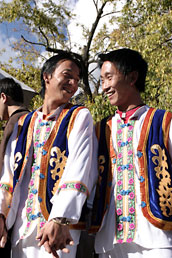
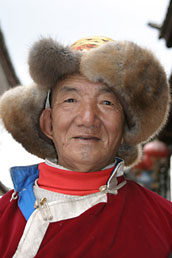
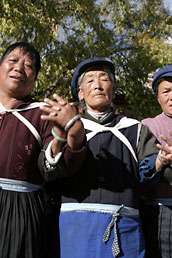
That evening we are the guests of honour at a banquet in a village near Lijiang hosted by the Communist Party secretary. Michelle and I join him on his table, but we have scant opportunity to eat because everyone keeps coming up to toast us and our host. It seems the fancier the meal the less you eat as you are continually bobbing up and down to knock back a glass of spirit. During the evening our host sings a local folk song to rapturous applause and is followed in the same vein by several others. I know what's coming, and my fears are realised when I am invited to sing a traditional British song to the 50-odd diners. My mind is blank from the 15 shots of liquor. Lillian suggests Auld Lang Syne, but as I stand up to sing it the drink fogs my brain again and I get the opening words wrong - with the video camera rolling. Somehow I muddle through and get a reception I don't deserve. And I breathe a huge sigh of relief when I discover Mr Wang had forgotten to switch on the camera's sound.
Old Lijiang is full of bars which are very atmospheric at night. One night we film in a bar full of pictures of a strikingly pretty girl in traditional costume. The girl is from the Mosuo minority group who live by a remote lake on the border with Sichuan province. The new owner tells me the girl had been forced to leave her village because her parents had frowned on her relationship with an outsider. They had moved to Lijiang and opened up the bar, but had moved back and sold the bar to him after she gave birth to a baby girl and her parents accepted her partner. I am fascinated by the story, especially when I learn that the Mosuo culture is one of the last remaining matriarchal societies in the world and women head households. They also practice a form of open marriage called zuohun, or walking marriage. Couples get together at night but they don't live together. The man returns to his home the next morning, eating all his meals there and sharing with the family chores. The couples don't share any possessions and children born from the relationship are brought up by the girl's mother and family. In this innocent society girls can also take the lead in a relationship by "talking" with their eyes or lightly scratching their intended's palm.
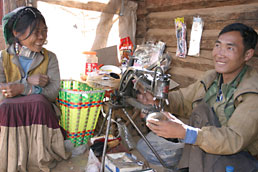
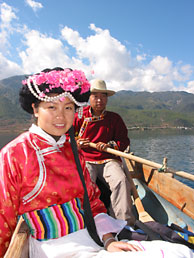
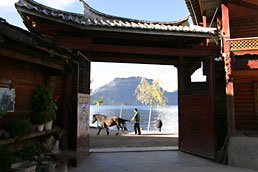
Reaching Lugu Lake takes five hours of driving in the bus at almost breakneck speed along mountain roads with terrifying switchbacks and sheer precipice drops to a raging torrent below, passing rural scenes unchanged for centuries. The lake stretches out before us after a mountain pass beyond a pristine forest of pine, spruce and fir. The village of Luoshui is set on the lake edge, its dirt road main street skirting the water and resembling a Wild West frontier town with wooden buildings and ornate gates on the opposite side. Many of the traditional farm homes have added guestroom blocks, and I chat with the matriarchal grandmother of the household where we are staying as she spins her Buddhist prayer wheel. She invites us to have breakfast in her home next morning. It is on one side of the courtyard next to the guestrooms, and adorning one wall alongside a dead pheasant is a poster of England football captain David Beckham. I can't even escape him in deepest China.
During dinner I am serenaded by a couple of Mosuo girls dressed in their beautiful, flowing traditional costumes, then have to take a bite of a boiled chicken's head presented in my honour by my host, the Communist Party secretary for this region. By the end of the meal we are getting along like a house on fire. That evening I meet and chat with an old man who was the first Mosuo to go to England. His story is fascinating and incredible. At just 17 he walked to Tibet and became a monk, then walked across the Himalayas to India 10 years later after the failed Lhasa uprising which led to the Dali Lama's exile and China regaining control of Tibet. He eventually made his way to England via Holland and stayed for 26 years, working for an international charity, until he decided to return and live out his days back in his home village with his remaining family. I also meet the Mosuo girl who left to set up the bar in Lijiang. She now runs a bar in Luoshui and she and her partner tell me their moving story and show me their lovely baby daughter.
I spot one of the Mosuo girls who serenaded me at a firedance being held by the village, in which the local girls and young men dance around a roaring fire to the accompaniment of a flute. The director tells me to join in, and the girl lets me in. I can manage the footsteps easily at first but as the music tempo increases the steps get harder and I can't keep up. I bow out of the frenzied circle, blowing any chance I might have had if I were single. The village and its setting are made for romance, highlighted when I bump into a Shropshire lad, Peter, I had met earlier at a viewing spot overlooking the lake. He walked off into the moonlit night hand in hand with his Chinese girlfriend. I returned to my room alone, but falling in love with this enchanting place.
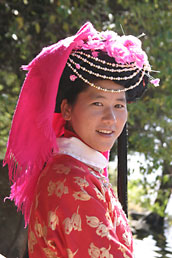
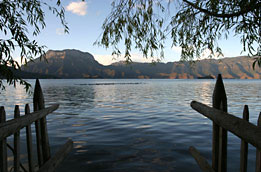
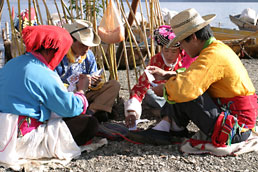
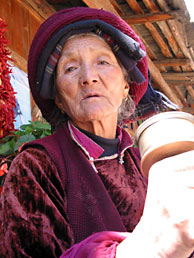
Breakfast of yak milk tea and corn bread in our matriarch landlady's home is followed by a boat trip across the lake to a small island housing a Buddhist temple in two boats. Each is rowed by a Mosuo girl at the front and a local lad at the stern, the girl in the second boat the one I had abandoned at the dance the night before. As she rows, our girl starts singing a haunting love song duet with the lad rowing the other boat, their voices carrying across the flat calm of the lake's crystal waters. They repeat the song on the return trip before both crews have a water fight with their oars.
On the boat trip my new-found Communist Party friend, Mr Zhang, tells me about proposals to remove the tourist accommodation and re-site it in another location, to preserve the spirit of the village and stop it from being swamped by visitors and to protect the lake's fragile environment. He also sets me five riddles, saying I cannot leave unless I guess them all correctly. Sadly I do. Over lunch he toasts then hugs me warmly, saying he regards me as his older brother, and before we depart he sings me a love song - strange in any other circumstance but strangely normal in this situation. As he escorts me in his chauffeured Landcruiser to the entrance gate I start weeping silently, tears of sadness at leaving a true paradise on earth and tears of joy at having met such innocent and untainted people. Few places have moved me so much and in such a short time. The tears are soon replaced with laughter when he points out my big nose is regarded as a sign of sexual endowment, adding that he hopes to see "lots of little Peters" running around after my next visit!
If I had doubted the reality of Shangri-La before, my visit to the kingdom of the Mosuo women at Lugu Lake proved it does indeed exist, for me at least. And despite the encroaching influence of tourism, Lijiang is as close to paradise as you are likely to find anywhere in the world. I truly hope both can withstand the pressures and exploitation of commercialism. Otherwise it wouldn't be a case of Lost Horizon so much as paradise lost.
Postscript: At dinner on our final night in Lijiang I am given the title Lao Pi Tongzhi by a journalist-turned-industrialist who has been escorting us around Yunnan. It means Old Comrade Peter, a term used in the old days of staunch Communism. It seems I am now a fully paid-up Party member.
Next stop: Kunming.